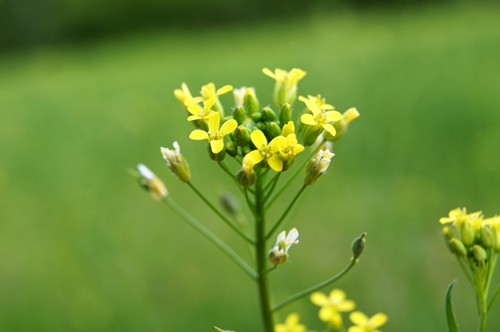14 August 2015. A biochemistry lab at Kansas State University genetically engineered camelina oilseed plants to make them better feedstocks for biofuels and chemicals. The team led by Kansas State professor Timothy Durrett published its findings in the August issue of the journal Plant Biotechnology Journal (paid subscription required).
Durrett, with colleagues from University of Nebraska and Michigan State as well as Kansas State, are seeking to make the Camelina plant a more economically productive resource. Camelina sativa is a plant related to canola and a member of the mustard family that grows from one to three feet tall, producing seed pods containing many small, oily seeds. It is a fast-growing plant in the northern U.S. plains with a short growing season, and can produce seeds with less rainfall and little fertilizer.
In its natural state however, Camelina does not produce oil efficiently enough for adoption as a feedstock for biofuels or as a substitute source for petrochemicals. Associates at Kansas State are looking into chemical solutions for boosting Camelina’s oil output, as reported in Science & Enterprise in 2013. Durrett’s team is using a different approach, taking advantage of the recent sequencing of the Camelina genome to make the plant more productive.
In this case, the researchers sought not only more output, but also to produce an oil with low viscosity needed for biofuels. The team identified a gene in Arabidopsis seeds that in earlier studies was found to produce the desired type of oils, called 3-acetyl-1,2-diacyl-sn-glycerols, or acetyl-TAGs. In their new study, the researchers transplanted the Arabidopsis gene into the Camelina genome.
The results show the engineered Camelina plant can produce as much as 85 percent of its oil with acetyl-TAGs as well as a lower freezing point, making it a more commercially desirable product. The researchers also tested germinating the seeds and producing seedlings to verify the engineered plants could be grown.
In addition to biofuels, the Durrett believes the enginered Camelina plant can become a feedstock for industrial uses, such plasticizers, biodegradable lubricants, and food emulsifiers.
Read more:
- Process Adds Antimicrobial Silver Particles to Plants
- Arcadia Bio, Partners to Produce Stress-Tolerant Soybeans
- Gene Editing Modifies Tree Genomes to Reduce Lignin
- Patent Awarded for Plant Gene Sequence Engineering
- Plant Science Biotech Gets Genome Editing Technology
* * *


 RSS - Posts
RSS - Posts
You must be logged in to post a comment.